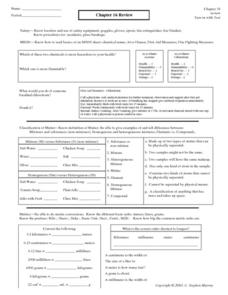Curated OER
Review Sheet for Covalent Compound Quiz
In this covalent compounds worksheet, students name 6 compounds given their chemical formulas, they write the formulas for 6 compounds given their chemical names and they answer questions about boiling points and solubility. They write...
Curated OER
Intermolecular Forces
In this intermolecular forces activity, students perform a simple experiment with water to observe the intermolecular forces that hold water together as they fill a beaker as much as possible. They explain the results of their...
Curated OER
Practice Sheet: Colligative Properties
In this colligative properties activity, students solve eight problems. They calculate molarity, molality and grams of substances in addition to using colligative properties to calculate solutions.
Curated OER
Intermolecular Force Worksheet
In this intermolecular force worksheet, students identify the molecules with the strongest intermolecular forces and explain how they determined this. They also predict boiling points and vapor pressure based on intermolecular forces of...
Curated OER
Chemistry Worksheet-Phase Changes
In this phase change worksheet, students answer twenty questions about changes in energy to a system. They analyze phase diagrams, the determine the effects of changes in temperature on a system, they answer questions about miscibility,...
Curated OER
Amines
In this amines worksheet, students solve 7 problems including classifying given structures, ranking them based on their boiling point, and naming structures.
Curated OER
Temperature Change and the States of Matter
Tenth graders observe the processes of evaporation, condensation, melting, freezing, boiling, and sublimation. They do a quantitative investigation of the freezing of water, to explore explanations that involve particles.
Curated OER
Ionic Compounds
In this compounds worksheet, students review the structure and properties of ionic compounds, their formulas and nomenclature, and molecular mass and percentage composition. This worksheet has 4 short answer questions and 7 problems to...
Curated OER
Chemistry E3 Lesson Plan
Ninth graders perform a series of experiment to investigate heat transfer and phase changes. In this physical science lesson, 9th graders identify and calculate the different subatomic particles. They explain the importance of scientific...
Curated OER
Chemquest: Physical Changes or Chemical Reactions
Students study the differences between physical and chemical changes. In this chemical reactions lesson students participate in an indoor and outdoor lab activity.
Curated OER
Characteristics of Crystals
In this crystals worksheet, students complete a graphic organizer by filling in the characteristics of the different crystal types including melting/boiling point and electrical conductivity.
Curated OER
A Watched Pot Never Boils
Students determine how long it takes to bring a specific amount of water to a rolling boil. Students conduct this experiment at home with their parent or guardian. Students write down observations as the water begins to boil. Students...
Curated OER
Comparing Properties of Elements & Compounds
In this elements and compounds worksheet, students review the physical properties of different compounds and elements using websites for information. This worksheet has 1 graphic organizer and 1 short answer question.
Curated OER
Is it Ionic?
In this ionic compounds worksheet, students are given clues about compounds such as their physical and chemical properties in order to determine if they are ionic compounds. Students indicate which compounds are ionic and which are not.
Curated OER
Physical and Chemical Trends in the Group 7 Elements
In this elements worksheet, students complete a graphic organizer by comparing the melting point, boiling point, density, and electronic configuration of given elements. Students determine the characteristics of Group 7 elements. This...
Curated OER
Alkanes: Physical Properties
In this alkanes worksheet, learners complete a graphic organizer by filling in the number of carbon atoms for the given alkanes. Students plot a graph showing how physical properties change with the number of carbon atoms. Then learners...
Curated OER
Haloalkanes: Physical Properties
In this gases worksheet, students use data tables comparing the density and boiling points for given haloalkanes to complete 3 short answer questions.
Curated OER
Alkanes and Alkenes
In this alkanes worksheet, students use a data table to plot a graph of boiling point against number of carbon atoms. Students define cracking and double bond. This worksheet has 5 short answer questions.
Curated OER
Physical Properties of Group 1 Elements
In this elements worksheet, students complete a graphic organizer by filling in the symbol and atomic number for given elements. Students plot a graph of melting point against atomic number. Students write the electron arrangements for...
Curated OER
Changing State
Students investigate the cooling and heating of water. In this online science experiment lesson, students work in groups to make predictions regarding freezing and boiling points and then test those predictions as they complete the...
Curated OER
Water Unit
In this water worksheet, students review the properties of water including the density, boiling point, and evaporation. Students define mixture, solute, and solvent. This worksheet has 22 short answer questions.
Curated OER
Chapter 16 Review- General Science
For this review of general science worksheet, students classify examples of matter as mixtures or substances, homogeneous or heterogeneous mixtures, or elements or compounds. Students also convert several examples using the standard...
Curated OER
Behavior of Liquids and Gases
For this liquids and gases worksheet, students review 9 vocabulary terms associated with liquids and gases by completing a crossword puzzle.
Curated OER
Freezing and Boiling Point
In this freezing and boiling point graph worksheet, students use the graph illustrated to respond to several questions that follow. They identify what is the freezing, boiling, and melting point of the substance in the graph. Students...

























